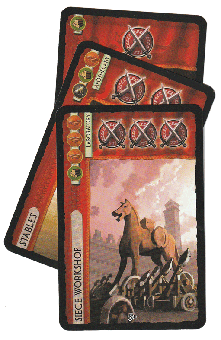
You can feel the power of antiquity, and the enthusiasm of players young and old, who give it 7.7 at BoardGameGeek!
Each player is entrusted with control of one of the seven wonders of the ancient world … Colossus of Rhodes, Babylon, and that kind of thing. Over the course of three time periods (ages) which define the three phases that the game passes through, players set out to gather resources, develop commerce, and become militarily mighty.
All of these pump up the victory points ~ occasionally the heart rate.
As you’d expect, each of the 7 Wonders has its own unique way of working to enhance and enable its owner. So everybody’s on a different playing field from the outset – nothing’s level in antiquity.
In each of the three ages, players receive seven cards: nicely designed, with attractive graphics. These are used to achieve various ends and effects. All the effects and other important informations are neatly described by pictorials on the cards, and everything is made clear in to-the-point notes in the manual.
It isn’t too long before one gets to learn what means what – a little less time than it took to build the Colossus of Rhodes, anyway. 😆
Most of the cards carry some kind of cost. Costs will be either coins or resources (like bricks, wood, or glass), so players are constantly aware of the need to seek to have some money to hand, and to develop their access to resources.
Many cards bring immediate benefits. Others are more of an investment for the future.
Several bring benefits in later ages, bolstering players’ efforts to assert themselves later on, as the ages roll by.
It can be a delicate process, strategically balancing the uncertainties around immediate gain or deferred gratification, ever hopeful of more substantial gain in the long run.
In each turn, players choose just one of their cards and lay it face down.
The others are left face down also, put a little to one side out of the way.
Then, when all are ready, all the chosen cards are turned over, and their effects are put to work.
This frequently will call for interaction between players (especially those immediately adjacent),
like paying to borrow their resources, for example.

Let’s not go into detail here, but the actions include ..
► adding – expanding the range of structures within the ‘town’ that adjoins the wonder. Adding Baths, or Stables for example.
► building – adding to the the structure of your wonder, taking your wonder to another stage of its development.
► simply discarding the card, so as to be able to grab three coins from the bank.
Before players have got an epoch’s experience in playing, the designers suggest they might go around the table as they take their actions one-by-one: all can watch and gain familiarity. But when the antiquarians are up and running with 7 wonders, actions take place simultaneously: you can just get on with it once the cards are turned.
To me, that sounds a bit ‘mechanical’, and nowhere near so much fun. It might appeal to more highly tuned players, but probably not to ‘casuals’.
Once the card actions have happened, all the cards that were not chosen are passed to one’s neighbour. So all know what their neighbour has: if anyone can remember 😃.
You can (meanly) try to torpedo your neighbour’s next turn by deliberately not passing on a card that would markedly benefit them.
Each then chooses another card from the deck they were passed, and the process repeats until six of the seven cards that were dealt at the start of the age have been chosen and enacted: the last card is left unplayed.
At this point, the military might of each of the wonders is compared to the wonder next to them, and battleground scores are calculated. The mighty will gain, but the defeated will accrue negative points – sound familiar?
After three ages, the game ends, and all those victory points are summed and calculated. Most victory points = winner.
- quite a lot to get your head around, but a good manual
- the second game’s a lot easier – it may even be faster 😁
- every game’s different
- short set up time
- strategic thinking is going to help
- despite the stacks of card-options, it’s seen as not hard to play/learn
- at every wondrous age, decisions matter mightily
- it has an excellent two player variant (Duel)
The two player game is just as wondrous
…. here’s Eric’s wonderful review


